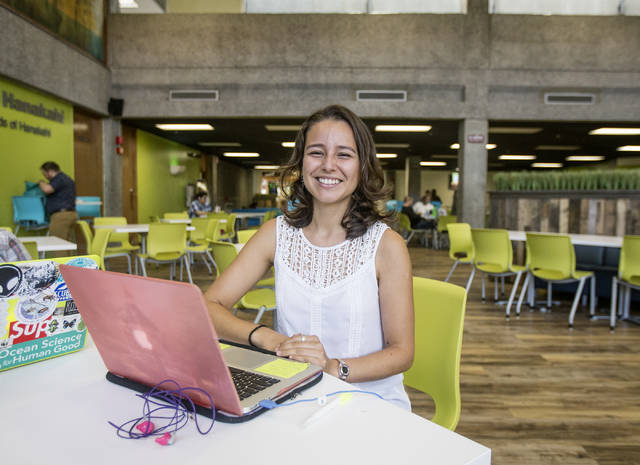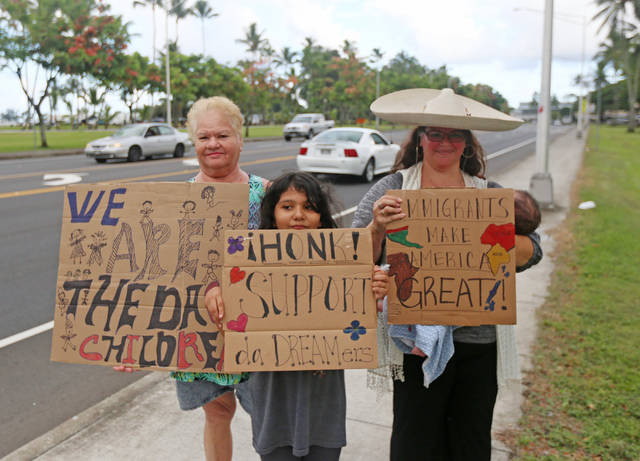Big Island DACA recipients worry about future after Trump ends program
Karen Gallardo has big plans for the future.
ADVERTISING
The 24-year-old moved from California to Hilo this summer to enroll in the University of Hawaii at Hilo’s Tropical Conservation Biology and Environmental Science graduate program. She eventually wants to complete a doctorate degree and forge a career in research.
But for Gallardo, an undocumented immigrant who came to the U.S. from Mexico as a 1-year-old, her education plans are now largely riding on the future of the Deferred Action for Childhood Arrivals program, or DACA.
The program, established under former President Barack Obama, allows immigrants brought to the U.S. illegally as children to get work permits and blocks them from deportation. DACA has been in limbo since last week after President Donald Trump announced he would phase it out in six months, designed to give Congress time to find a legislative fix for the program’s participants.
“If I lose my DACA that means I’d lose my work permit which means I lose my graduate assistantship which means I can’t complete the (TCBES) program,” Gallardo said Tuesday during an interview on campus with the Tribune-Herald. “So thinking about those logistics is definitely a little bit scary. Because I wouldn’t be able to complete my education unless I found another way to fund it.”
There are about 800,000 DACA recipients nationwide, including about 558 DACA grantees in Hawaii, which is among states with the lowest DACA participation. There are 13 self-identified DACA recipients enrolled in the UH system. There is one self-identified DACA student at UH-Hilo, according to information provided by UH last week. A UH-Hilo administrator said Tuesday the actual number is likely higher — data provided only includes Hawaii resident students (Gallardo is considered a nonresident student) — and only includes students who choose to disclose their DACA status.
Since last week, dozens of Hawaii Island DACA supporters have protested Trump’s decision. About 16 UH-Hilo students and staff reportedly gathered Friday for a “Defend DACA” march and rally.
The Kailua-Kona-based Comunidad Latina De Hawaii organization also led “Stand Up for DACA” rallies Thursday in Kona and Hilo. About 50 people collectively attended, mostly at the event in Kona, said organizer Angela Dean.
“Here on the Big Island, I personally know many of the DACA recipients and everyone is afraid and worried about what this could mean,” Dean told the Tribune-Herald on Tuesday. “They’re afraid they could be deported. The majority of these DACA recipients are the main breadwinners in their households. Or they’re enrolled in school and paying for expenses out of pocket. So they’re making all these sacrifices to better themselves, and having DACA taken away from them is worrisome. It’s causing them stress and anxiety.”
Trump’s decision also prompted more than a dozen states, including Hawaii, to sue the Trump administration over the president’s move to end the program. California on Monday was the latest state to file a lawsuit.
“Everything is up in the air,” said a 29-year-old West Hawaii-based DACA recipient during a phone interview Tuesday. The recipient requested anonymity for fear of being flagged for deportation. “I have a family to support and I pay my taxes and I just want a chance and an opportunity. (Before DACA) I was living in fear. I barely drove because I was scared if I got pulled over I’d be deported. If I do go back to Mexico, it’s like ‘What am I going to do?’”
Those who support ending DACA argue it prevented some legal citizens from finding work. U.S. Attorney General Jeff Sessions said last week DACA has “denied jobs to hundreds of thousands of Americans by allowing those same jobs to go to illegal aliens.”
The program no longer is accepting new applications, though those already enrolled remain covered until their permits expire. If that happens before March 5, they’re eligible to renew them for another two years so long as they apply by Oct. 5.
Gallardo said she knew she was undocumented as a child but didn’t realize the implications until she was older. She said deportation was a concern growing up particularly because her younger sister, who was born in the United States, would be separated from the rest of her family should they be deported.
Gallardo said she “lost a little bit of hope” when she first began applying for colleges because she wasn’t able to get a driver’s license, apply for a job or receive financial aid.
“I thought ‘What’s the point of going to college if I can’t get a job afterward?’” Gallardo recalled. “So, I actually started looking into applying to universities in Mexico. I was like, ‘I might as well just go back.’”
Gallardo ultimately attended the University of California at Berkeley after receiving financial aid designed for undocumented students. Gallardo said she applied for DACA within months after it was established in 2012. The work permit allowed her to apply for several jobs and a driver’s license, which she said cut her 1 1/2-hour bus ride to school to just a few minutes by car.
Gallardo said applying for DACA has been “definitely worth it” despite the latest uncertainty. She said she understands why some people are critical of the program and thinks those who oppose it should look at DACA’s numerous “positive examples” who are “working to improve our lives, and the lives of our families, and hopefully, through our professions, your life too.”
“Because we’re becoming doctors and lawyers and teachers and any field you can imagine there’s probably at least one of us represented,” Gallardo said. “So give us a chance.”
Email Kirsten Johnson at kjohnson@hawaiitribune-herald.com.





Sorry but ya gotta go. It not trumps fault. It’s house and senate. Laws are laws and I would enforce the deportation of any and all immigrants that have committed crimes against the citizens and country of the United States.